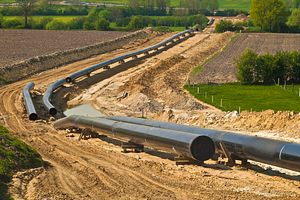The recently concluded deal between Iran and the P5+1 group of world powers presents a range of opportunities for Pakistan. Under the deal, known as the Joint Comprehensive Plan of Action, Iran will receive relief from sanctions that were put into place by the United Nations, the United States, and the European Union for its nuclear program. For Iran’s neighbors, including Pakistan, this means reduced barriers for commercial activities. Specifically, the windfall from the Iran nuclear deal could reinvigorate the construction of the troubled Iran-Pakistan pipeline project.
A recent Agence France-Presse report notes that the $7.5 billion infrastructure project—a potential source of respite for energy-starved Pakistan—may allow Pakistan to meet its obligations and lead to the completion of the pipeline. As I noted in The Diplomat in late 2013, Pakistan pledged to accelerate the construction of its side of the pipeline but that later fell flat due to Pakistan’s inability to finance construction. In particular, Iran withdrew a $500 billion loan that would have allowed Pakistan to complete its part of the pipeline.
Most recently, following Chinese President Xi Jinping’s visit to Pakistan in April 2015, it became apparent that China would buttress Pakistan’s efforts to complete its side of the pipeline. Geographically, the southern end of the China-Pakistan Economic Corridor (CPEC), a massive infrastructure initiative that was formally unveiled during Xi’s visit to Pakistan, will end at the China-financed port city of Gwadar. Under the current arrangement, Pakistan will build the portion of the pipeline between Gwadar and the Iranian border (roughly 80 kilomters), and China will integrate the rest of the pipeline with the broader CPEC, including extending the pipeline to the Pakistani city of Nawabshah, north of Karachi.
For its part, Iran welcomed Chinese involvement in the pipeline. Following Xi’s April trip to Pakistan, Iran’s ambassador to China Ali Asghar Khaji noted that the extension of the Iran-Pakistan pipeline would be in Iran’s interest, as well as in the interest of China and Pakistan. For China, having direct access to natural gas from Iran’s South Pars field—the world’s largest natural gas field—would be coup as far as its energy security was concerned.
According to Pakistan’s Minister of Petroleum and Natural Resources Shaihd Khaqan Abbasi, the Iran nuclear deal will enable Pakistan to complete its portion of the pipeline. “Now hopefully, as the sanctions are removed, it facilitates us to address our energy need and also meet the contractual obligation,” Abbasi notes in the AFP report. It is unclear if the minister’s statement means that Iranian financing could potentially assist Pakistan in the endeavor. For the moment, the timely completion of an Iran-Pakistan pipeline remains an open question, but the Iran nuclear accord and China’s growing stakes in Pakistan’s infrastructure make it more likely.
Beyond the pipeline, Islamabad is looking to expand trade with Iran once the nuclear accord is fully implemented and sanctions are lifted. Syed Tariq Fatemi, speaking at an event in Washington D.C., noted that “An end to sanctions will open up new opportunities for Pakistan to enhance its commercial and economic ties with Iran.” “We have a long border, and we could have massive trade with that country should this issue of sanctions no longer be hovering over us,” he added.
While the Iran nuclear deal won’t be fully implemented until late-2015 or early-2016 at the earliest, Iran and Pakistan will likely continue to consult on their prospects for mutually beneficial economic cooperation. On the security front, both countries will be eager to reduce tensions that have grown along the border due to unrest in Pakistan’s Balochistan and Iran’s Sistan-Baluchestan provinces. In recent months, Pakistan-based Sunni militants, affiliated with groups such as Jaish-ul-Adl, have carried out cross-border strikes against Iranian border guards, heightening Iranian frustrations.

































